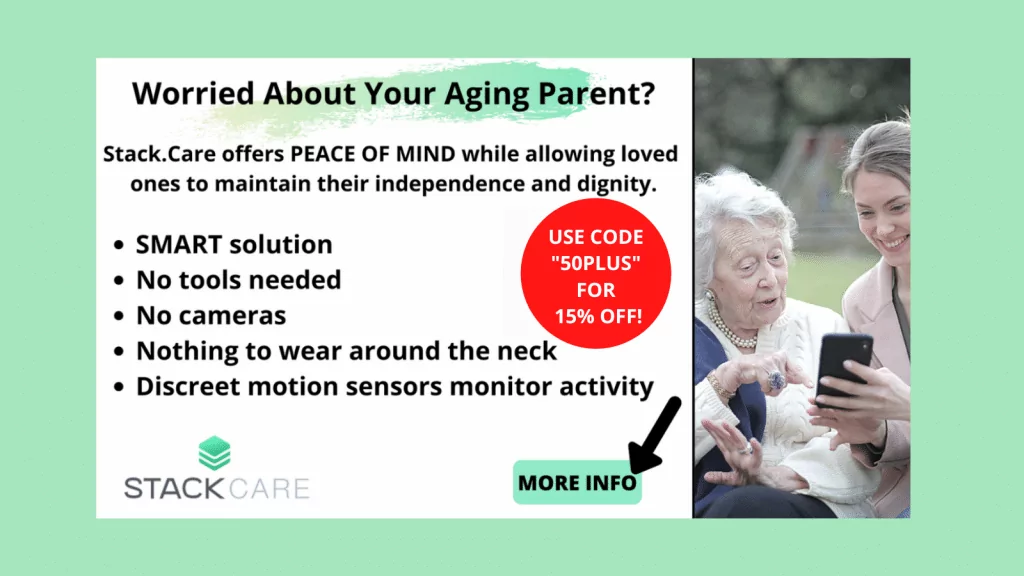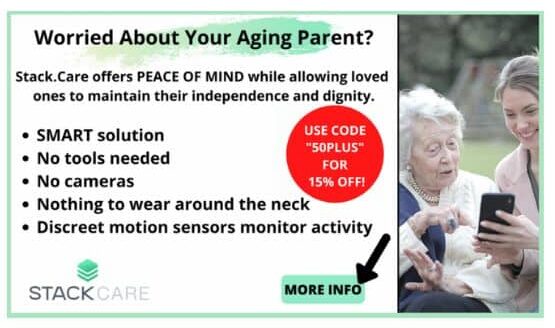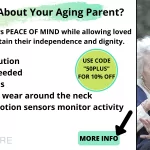As a caregiver for my 93-year-old Father who lives out of state, I look for technology to help provide me with peace of mind when I can’t be with him. Stackcare is a relatively new smart technology on the market that uses motion sensors and artificial intelligence to learn behavior and activity patterns.
Dad, a fiercely independent and proud man, is in good health, but has balance issues and is somewhat confused. He lives alone in the same house in which he raised his family. My siblings and I respect his wishes to continue to age in place and work together to find solutions that allow him to do so. We tried to get him to wear a life alert button around his neck without much success. The life alert product and accompanying service were good, but he did not want to wear it. It made him feel, in his words, “old and feeble”.
Stackcare Smart Technology
Just as I started to research possible options, Stackcare contacted me as the Publisher for 50PlusToday to request I try out their product, created using artificial intelligence. The timing was perfect, and I immediately agreed to test the Stackcare smart technology.
Learn more about Stackcare on their website. (50PlusToday readers receive a 15% discount using the code “50Plus”!)
Benefits of Stackcare
Stackcare turned out to be a great option. The discreet motion sensors were easy to install without tools using command strips. Inside the house, I put one near Dad’s bed, one at the entrance to the bathroom, one in the TV room and one near the refrigerator. The system sends messages directly to my smart phone in real time. I can see at a glance if Dad’s activity patterns have changed. Additionally, a help button comes with the package, which when pressed, sends an immediate alert to family and caregivers. We have not had to use this feature, but it’s comforting to have it.
The information I receive daily tells me if Dad is sleeping ok and for how long. I want to be sure he walks around the house into the different rooms and does not spend most of the day in bed. The Stackcare communications, which utilize artificial intelligence, also let me know if his bathroom habits change; too many visits in one day might signal a urinary tract infection. The sensor pointed at the refrigerator tells me if the doors open and close regularly throughout the day. If not, I then know he is not eating. Another helpful feature is that the system monitors the temperature to detect if the house is too hot or too cold, which can lead to problems such as hyperthermia or dehydration.
StackCare is also able to detect potential falls by analyzing real time motion data. When something doesn’t seem right, such as a lack of motion for an extended period of time or a change in typical behavior patterns, the family or caregiver receives an alert. The technology does not require the senior to do anything, such as push a button, which sets Stackcare apart from other products. Happily, I’ve not received this type of message thus far and hope I don’t, but knowing this feature is part of the package provides me with enormous peace of mind.
Potential Issues Related to Using Stackcare Smart Technology
Unfortunately, Dad’s internet is unreliable, which is not Stackcare’s fault. However, this means the system goes offline when the Wi-Fi is down. When I told Stackcare about this issue, they told me they are working on an LTE version for people who don’t have good Wi-Fi, which should solve that problem.
Setting up the app is not difficult, but I should mention the instructions must be followed precisely for the system to work. People who don’t like to read directions may have a problem.
The Bottom Line
As a long-distance caregiver, this cutting-edge technology gave me great comfort and allows Dad to remain at home for longer for a reasonable cost. Caregivers receive the equipment for no charge, then pay a monthly fee for monitoring. Stackcare gives a discounted rate for clients who choose to pay up-front for a year. The monthly/annual fee varies depending on the number of sensors used in the house.
I spoke recently to a colleague who also tested the product. Laurie Miller, owner of Apple Care & Companion, a non-medical home care agency, had a good experience with Stackcare as well. In her words:
I’ve tested different technologies over the years geared toward keeping older adults safe in their own home. Stackcare checks all the boxes for me. It’s easy to set up, easy to use and reliable. I highly recommend it.
FAQs About Artificial Intelligence (AI) in Smart Home Devices
How does AI in smart home devices help seniors age in place?
AI-powered smart home devices can automate tasks, monitor activities, detect emergencies, and provide personalized assistance, enhancing seniors’ safety, well-being, and independence.
How can AI help with fall detection?
AI algorithms can analyze movement patterns captured by sensors and cameras to identify potential falls. They can then send alerts to caregivers or emergency services for quick assistance.
How does AI personalize assistance for seniors in smart devices?
AI can learn seniors’ routines, preferences, and needs over time. This allows smart devices to notify caregivers of changes in behavior patterns.
Can AI in smart devices predict potential health issues?
AI can analyze data over time to identify patterns or trends that might indicate health risks, allowing caregivers and healthcare providers to intervene early.
How do caregivers and family members benefit from AI-powered smart devices for seniors?
Caregivers can remotely monitor seniors’ well-being, receive real-time alerts in emergencies, and stay informed about their loved ones’ activities and routines. These devices provide great peace of mind, particularly for out of state caregivers.
Can smart devices enable seniors to remain in their own homes longer?
AI-powered smart home devices can provide seniors with personalized support, allowing them to maintain their independence and quality of life as they age in place.












